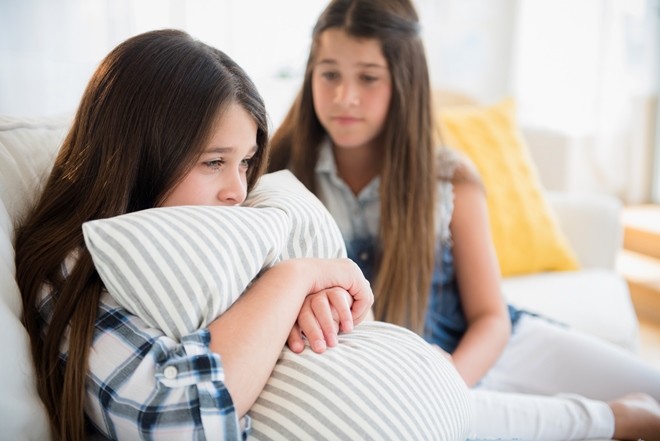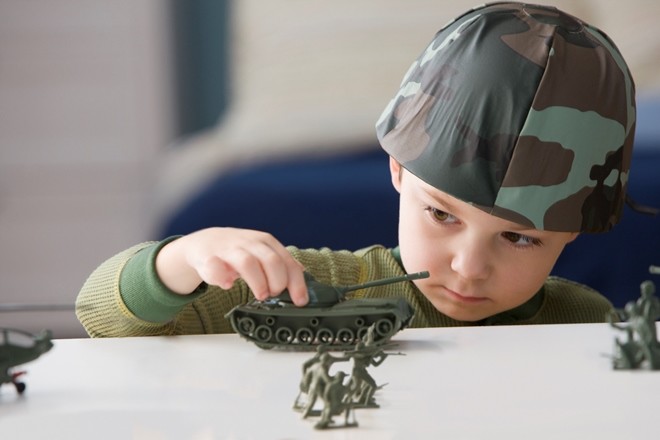"Just Live": Don't Deceive
- Mom, will you never, ever leave me?— Timofey buries his face in my neck and practically presses himself into my side. I pause. I can’t find the words to tell the truth. — Why such thoughts all of a sudden? — I ask a counter question. — I’m really scared that one day you’ll disappear. I quickly say something like “I’ll be with you as long as you need me.” Although I understand that this is also a potential deception. Anything can happen. But I’m not ready to talk to a preschooler about death yet. Or is it time? Photo: GettyImageOur expert, family psychologist, the founder of the project Familybuilding Daria Grosheva:
Photo: GettyImageOur expert, family psychologist, the founder of the project Familybuilding Daria Grosheva: Interest in death in children appears with aboutfive or six years. They see a certain pattern in what is happening around and want to understand it. They ask parents uncomfortable questions: "Why do people die?", "Will I die?", "Will you die?". Of course, without special need to touch on this topic is not worth it. But you do not need to ignore it either. I am a supporter of honesty in talking with children. Yes, it happens. But very, very not very soon. You can say that there are diseases, there are accidents. At the same time, the child should be returned to reality after such a conversation. "Look, we're all well, I'm driving my car carefully, you have no reason to worry." The important phrase: I will love you always. If the child is not too emotional, he will accept such an explanation. But one thing is some kind of abstract death, the other is when it concerns you personally. "When my father died, my daughter could not understand for a long time where my beloved grandfather had gone," recalls the mother of the six-year-old Katya. - We were afraid to tell her the truth right away, we were told for a long time that he was sick. Then, after all, they confessed. Now the girl is very afraid to get sick herself and falls into hysterics when we catch cold with my husband. It seems to her that we will die.
Interest in death in children appears with aboutfive or six years. They see a certain pattern in what is happening around and want to understand it. They ask parents uncomfortable questions: "Why do people die?", "Will I die?", "Will you die?". Of course, without special need to touch on this topic is not worth it. But you do not need to ignore it either. I am a supporter of honesty in talking with children. Yes, it happens. But very, very not very soon. You can say that there are diseases, there are accidents. At the same time, the child should be returned to reality after such a conversation. "Look, we're all well, I'm driving my car carefully, you have no reason to worry." The important phrase: I will love you always. If the child is not too emotional, he will accept such an explanation. But one thing is some kind of abstract death, the other is when it concerns you personally. "When my father died, my daughter could not understand for a long time where my beloved grandfather had gone," recalls the mother of the six-year-old Katya. - We were afraid to tell her the truth right away, we were told for a long time that he was sick. Then, after all, they confessed. Now the girl is very afraid to get sick herself and falls into hysterics when we catch cold with my husband. It seems to her that we will die. If this happened in the family, you need to immediatelyexplain what happened, say why the person will not come again. Otherwise, the child begins to fantasize, make up ideas, and this can give rise to unnecessary fears. Do not identify death with some everyday situations. For example, you cannot say that the deceased "fell asleep." Otherwise, the child may be afraid to go to bed. In this sense, believers, on the one hand, have it a little easier, they have certain protective legends. On the other hand, you should not tell the child that he will definitely meet this person again someday. Preschoolers have no sense of time. They will wait for this meeting in the near future, especially if a very close loved one has passed away.
If this happened in the family, you need to immediatelyexplain what happened, say why the person will not come again. Otherwise, the child begins to fantasize, make up ideas, and this can give rise to unnecessary fears. Do not identify death with some everyday situations. For example, you cannot say that the deceased "fell asleep." Otherwise, the child may be afraid to go to bed. In this sense, believers, on the one hand, have it a little easier, they have certain protective legends. On the other hand, you should not tell the child that he will definitely meet this person again someday. Preschoolers have no sense of time. They will wait for this meeting in the near future, especially if a very close loved one has passed away. Photo:GettyImageIf the child is still having a hard time experiencing the situation, you need to work through the situation with him through a "game". Conduct a symbolic ritual: for example, release a balloon into the sky as a farewell. Ask to draw what scares you. And, of course, talk. And as calmly as possible. If the parent himself reacts painfully to such topics, then the child will have the same emotions.
Photo:GettyImageIf the child is still having a hard time experiencing the situation, you need to work through the situation with him through a "game". Conduct a symbolic ritual: for example, release a balloon into the sky as a farewell. Ask to draw what scares you. And, of course, talk. And as calmly as possible. If the parent himself reacts painfully to such topics, then the child will have the same emotions.
Family in half: the kid has the right to be angry
Death is not only real, but alsometaphorical. For example, the death of a family. Yes, we are talking about the most unpleasant thing - divorce. Alas, it happens all the time. Someone, gritting their teeth, endures "until the children grow up", someone decides to cut "to the quick" right away. What is better? It is unknown. One thing is clear: whenever adults decide to separate, children will suffer the most. What rules must be followed to protect the immature psyche? Both parties should talk about divorce with their child.parent together. And be ready to answer any children's questions, and correctly, without irritation. Do not stray from the topic, do not keep silent about it, be ready to discuss together and separately as much as necessary. In conversations, emphasize that the reason for the discord is in no way him. The correct phrase: "Yes, we are hurting each other now, but you are not to blame for this, we both love you very much."
Both parties should talk about divorce with their child.parent together. And be ready to answer any children's questions, and correctly, without irritation. Do not stray from the topic, do not keep silent about it, be ready to discuss together and separately as much as necessary. In conversations, emphasize that the reason for the discord is in no way him. The correct phrase: "Yes, we are hurting each other now, but you are not to blame for this, we both love you very much." A photo: GettyImageShoulder, we are talking about the so-called "healthy" divorce, when a couple leaves if not good friends, then at least not on knives. And both parents have the opportunity to devote sufficient time to the child. But often it happens that a man and a woman turn into the worst enemies. And the child is at the forefront of this emotional war, when each of the "opponents" is trying to pull him to his side. And here it is not possible to give universal advice. As well as explain to the child, why suddenly one of the parents decided to disappear from his life.
A photo: GettyImageShoulder, we are talking about the so-called "healthy" divorce, when a couple leaves if not good friends, then at least not on knives. And both parents have the opportunity to devote sufficient time to the child. But often it happens that a man and a woman turn into the worst enemies. And the child is at the forefront of this emotional war, when each of the "opponents" is trying to pull him to his side. And here it is not possible to give universal advice. As well as explain to the child, why suddenly one of the parents decided to disappear from his life. - What exactly you can not do is showeach other "scoundrels." Your son or daughter is so bad. And if it's a teenager who is even more sensitive than a small child, it's even harder for him. For them, dad has always been good, and my mother says that he is bad. Or vice versa. He is literally torn between you. Do not make your child your confidant, your vest. This is your emotional war, do not drag it into it. Do not pour on him all their experiences and details of relationships. Do not deprive him of his childhood. Do not make him forget the past. For him it's scary: like this, I remember how I walked with my dad and played, and my mother says that we never spent time together. The expert explains: the most difficult is when, after divorce, the second parent basically disappears from the field of view of the former families. Ideally, this is a topic for a separate consultation with a psychologist who will help to work through the situation. But in any case, an adult left with a child (usually a mother) will not only have to cope with their emotions, but also take upon themselves the child's anger.
- What exactly you can not do is showeach other "scoundrels." Your son or daughter is so bad. And if it's a teenager who is even more sensitive than a small child, it's even harder for him. For them, dad has always been good, and my mother says that he is bad. Or vice versa. He is literally torn between you. Do not make your child your confidant, your vest. This is your emotional war, do not drag it into it. Do not pour on him all their experiences and details of relationships. Do not deprive him of his childhood. Do not make him forget the past. For him it's scary: like this, I remember how I walked with my dad and played, and my mother says that we never spent time together. The expert explains: the most difficult is when, after divorce, the second parent basically disappears from the field of view of the former families. Ideally, this is a topic for a separate consultation with a psychologist who will help to work through the situation. But in any case, an adult left with a child (usually a mother) will not only have to cope with their emotions, but also take upon themselves the child's anger. A child, especially a teenager, has a realgrief. You are getting divorced, and his world is falling apart. And he has every right to blame you for this. He has the right to be angry. There may be various harsh statements addressed to you. You should not be offended by this. But you should not allow yourself to be insulted either. If the conversation has reached a dead end, you need to interrupt it. Say: “You are upset now, we will take a break. But we will talk about this a little later.” And really talk until there is nothing left unsaid between you.
A child, especially a teenager, has a realgrief. You are getting divorced, and his world is falling apart. And he has every right to blame you for this. He has the right to be angry. There may be various harsh statements addressed to you. You should not be offended by this. But you should not allow yourself to be insulted either. If the conversation has reached a dead end, you need to interrupt it. Say: “You are upset now, we will take a break. But we will talk about this a little later.” And really talk until there is nothing left unsaid between you.
Military childhood: do not rush things
— My granddaughter was told about it in kindergarten.blockade, - says Anna Arkadyevna. - And the teacher said this: "Hundreds of children like you died of hunger because they had nothing to eat." The child cried at home, had nightmares for several nights. Is this really normal? Of course, you need to talk to children about the war. So that they remember, so that it doesn't happen again. But still, probably not at six years old to tell them such details... As well as with death, the first to raise inconversation with the preschool girl, the topic of war is not worth it. If asked or there is some thematic occasion, like Victory Day, the Day of lifting the blockade, then, of course, explain. But I'm sure, at this age of details, kids do not need to know, just a general story. They are all this and so will tell in schools, in history lessons. Everything has its time.
As well as with death, the first to raise inconversation with the preschool girl, the topic of war is not worth it. If asked or there is some thematic occasion, like Victory Day, the Day of lifting the blockade, then, of course, explain. But I'm sure, at this age of details, kids do not need to know, just a general story. They are all this and so will tell in schools, in history lessons. Everything has its time. A photo: GettyImageRemember, how once in childhood we played in the yard in voynushki and musketeers? The information space is different now. And the children's games are different .- Timothy, what are you playing at? - I watch him chasing after another and dropping him to the ground. - To terrorists! These are such bad guys that kill people all over the world. I now caught the terrorist.
A photo: GettyImageRemember, how once in childhood we played in the yard in voynushki and musketeers? The information space is different now. And the children's games are different .- Timothy, what are you playing at? - I watch him chasing after another and dropping him to the ground. - To terrorists! These are such bad guys that kill people all over the world. I now caught the terrorist. For them, terrorism does not make as much sense as forus. They play it, as we used to be soldiers. This overturns us, because we understand what we are talking about. But if just a game he does not show cruelty, aggression, then it's not scary. If you are unbearable to hear this, talk to him, ask him to change the game. Say: "I'm afraid when you say so." But do not forget that unreasonable prohibition gives rise to increased interest. Who is unlikely to play the war, so these are those who in this war really were. Or vice versa: only in it will it play, as in a single familiar reality. Children in the epicenter of battles are broken souls.
For them, terrorism does not make as much sense as forus. They play it, as we used to be soldiers. This overturns us, because we understand what we are talking about. But if just a game he does not show cruelty, aggression, then it's not scary. If you are unbearable to hear this, talk to him, ask him to change the game. Say: "I'm afraid when you say so." But do not forget that unreasonable prohibition gives rise to increased interest. Who is unlikely to play the war, so these are those who in this war really were. Or vice versa: only in it will it play, as in a single familiar reality. Children in the epicenter of battles are broken souls. No matter how you protect them, it will be a trauma for life.It can't be cured. He doesn't have a childhood anymore. You can love him, support him. And only this support will determine what will end up in his soul: a deep wound or a scar.
No matter how you protect them, it will be a trauma for life.It can't be cured. He doesn't have a childhood anymore. You can love him, support him. And only this support will determine what will end up in his soul: a deep wound or a scar.









